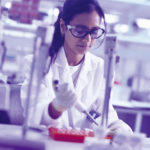
Have you ever wondered how a plant or a sponge from the ocean becomes a medication that a doctor prescribes to treat disease?
While pharmacists are highly trained to evaluate medication use; communicate with other health care providers; prepare and dispense medications; and educate patients about those medications, pharmaceutical scientists are expertly trained to discover, develop, test and manufacture new medications.
Typical pharmaceutical scientists spend most of their time in a laboratory discovering and learning how different compounds interact with disease-causing cells and organisms. In addition, they investigate how these compounds interact with the human body to ultimately determine if they can become new drugs.
Developing new drugs takes a very long time and costs a great deal of money. There are three stages to this process:
- Discovery: Identifying new compounds that help treat disease
- Development: Administering the new drug to animals and humans to make sure it is safe and effective
- Manufacturing: Producing the new drug in large quantities for distribution
Creating new medicines requires a large team of scientists with training in many different scientific disciplines including various areas of chemistry, biology, engineering, informatics and medicine.
During the discovery phase, pharmaceutical scientists may examine thousands of molecular compounds before they find one that effectively fights disease without harming the patient. Alternatively, hundreds of molecular pathways are evaluated to determine if a protein can alter the signaling in a beneficial way. If a pharmaceutical scientist identifies a promising new compound or target today, it may take up to 20 years before the medicine is available in your drug store.
Pharmaceutical scientists usually specialize in one aspect of the drug development process. They may:
- Design new drug therapies using natural or synthetic (man-made) ingredients
- Uncover new ways to use existing drugs to treat different types of disease
- Study how disease affects the body and what causes some people to develop certain types of disease
- Study how the human body responds to medications, so scientists can develop better, safer drugs Test drugs on animals and humans to ensure safety and efficacy
- Determine the most effective formulation and dosage for a specific drug
- Work on improving the drug manufacturing process
- Ensure the consistent quality of prescription medications
- Advise corporations or government agencies, including the Food and Drug Administration, on issues related to pharmaceutical development
Regardless of where they choose to specialize in the drug development process, pharmaceutical scientists have the satisfaction of spending their time looking for ways to help people fight disease and stay healthy.
Working Conditions
Pharmaceutical scientists are employed by any number of institutions, from large drug manufacturing and biotech companies and contract research organizations (CROs) to academic institutions and governmental agencies. Many work in laboratories as part of a large team of scientists and technicians developing new drug therapies. Others teach and work in offices near universities or hospitals, supervising clinical drug trials, or in manufacturing centers, overseeing the large-scale production of medications.
Pharmaceutical scientists use sophisticated computers and equipment, work with microscopic compounds and conduct scientific experiments. They must be extremely detailed and precise. They also need to be patient, because it can take a team of pharmaceutical scientists many years to bring a new drug to market.
Salary Range and Outlook
Pharmaceutical scientists just starting their careers earn an average salary of $85,000. With experience and increasing responsibility, their compensation can grow significantly. They also can receive bonuses throughout the development of a new drug.
Academic Requirements
To become a pharmaceutical scientist, you must have a strong interest in mathematics, biology, chemistry and the scientific process. You may want to decide early on which aspect of the drug development cycle you want to focus on – discovery, development or manufacturing. In college, you can major in the pharmaceutical sciences, pharmacy, biology, chemistry, medicine, engineering or a related field.
Good communications skills are important, because you’ll be working as part of a scientific team made up of people with diverse backgrounds. You’ll need to be able to stay motivated and keep your team energized throughout the long development process. You also must be able to handle failure and disappointment: Most promising new drugs are rejected before they ever reach the market, because they are dangerous, don’t work consistently or have unacceptable side effects.
During college, get involved with the student chapter of the American Association of Pharmaceutical Scientists. Explore internships and/or co-ops and look for opportunities to meet and “shadow” working pharmaceutical scientists.
Many pharmaceutical scientists begin working in the field after college and then go on to complete advanced degrees in more specialized subjects. Pharmaceutical companies often pay for talented workers to complete graduate and post-graduate degrees, such as Master of Science (M.S.), Master of Public Health (MPH), Doctor of Medicine (M.D.), Doctor of Pharmacy (Pharm.D.) or Doctor of Philosophy (Ph.D.), to help them qualify for advancement.
Learn More About a Career as a Pharmaceutical Scientist
- Take a look at the Introduction to Pharmaceutical Science.
